
Landscape and Ecological Engineering
Scope & Guideline
Pioneering research for a greener future.
Introduction
Aims and Scopes
- Ecosystem Services Valuation:
Research includes the assessment and economic valuation of ecosystem services provided by various landscapes, including agricultural, urban, and natural ecosystems. - Biodiversity Conservation:
The journal promotes studies related to the conservation of biodiversity across different landscapes, examining the effects of land-use changes and anthropogenic pressures. - Climate Change Impacts:
A key focus is on understanding and mitigating the impacts of climate change on landscapes and ecosystems, including adaptation strategies. - Urban Ecology and Green Infrastructure:
Research explores the role of green spaces and urban planning in enhancing ecological functions and human well-being in urban environments. - Landscape Restoration and Management:
The journal emphasizes methodologies and case studies related to the restoration of degraded landscapes and the management of natural resources. - Participatory Approaches:
It encourages participatory approaches in landscape planning and management, integrating local knowledge and community engagement. - Technological Innovations:
Utilization of modern technologies, including remote sensing and machine learning, to analyze and manage landscapes and ecological data.
Trending and Emerging
- Nature-Based Solutions:
There is a growing interest in nature-based solutions for landscape management, emphasizing ecological approaches to address climate change and enhance resilience. - Urban Heat Mitigation:
Research on strategies to mitigate urban heat through green infrastructure and landscape design is increasingly prominent due to rising urban temperatures and climate change. - Ecosystem Connectivity:
Studies focusing on ecological corridors and connectivity among habitats are trending, highlighting the importance of landscape connectivity for biodiversity conservation. - Behavioral and Psychological Impacts of Landscapes:
Emerging research explores how landscapes influence human behavior and well-being, particularly in urban settings, linking ecology with public health. - Machine Learning and Data Analytics:
The application of machine learning and data analytics in landscape and ecological research is on the rise, facilitating advanced analysis and decision-making in environmental management. - Restoration Ecology:
An increasing number of studies focus on restoration ecology, examining techniques and strategies to restore degraded landscapes and ecosystems effectively.
Declining or Waning
- Traditional Agricultural Practices:
Research on conventional agricultural practices is becoming less frequent as the focus shifts towards sustainable and innovative agricultural practices that enhance ecosystem services. - Static Landscape Assessments:
There is a noticeable decline in studies that only assess landscapes without considering dynamic ecological processes, reflecting a trend towards more integrative and adaptive management approaches. - Historical Landscape Analysis:
While historical perspectives are valuable, there seems to be a waning interest in purely historical landscape studies, with more emphasis now on contemporary issues and future-oriented research. - Species-Specific Studies:
Research focusing on single species without considering broader ecological interactions is decreasing, as the journal increasingly values studies that address ecosystem-level dynamics and interactions. - Localized Ecological Issues:
Studies that address ecological issues in isolation from larger environmental contexts are less frequent, indicating a shift towards more holistic approaches that consider multiple factors and scales.
Similar Journals

Global Ecology and Conservation
Empowering conservation through open-access research.Global Ecology and Conservation, published by Elsevier, stands as a premier open-access journal dedicated to advancing the field of ecology and conservation science. Since its inception in 2014, the journal has facilitated the dissemination of high-quality research, fostering critical dialogue on ecosystem management, biodiversity preservation, and sustainability practices across the globe. With a remarkable ranking within the top quartiles (Q1) in various categories including Ecology, Evolution, Behavior and Systematics, and Nature and Landscape Conservation, it is positioned among the leading resources for researchers and professionals alike. The journal has garnered a notable impact, ranking #65 out of 721 in Ecology, and houses articles that are vital to understanding and addressing the pressing environmental challenges of our time. Available in an open-access format, researchers can freely access and share vital findings, promoting a collaborative approach to ecological research. Global Ecology and Conservation is not just a publication; it is a critical tool for innovation and advocacy in conservation, poised to inspire the next generation of environmental stewards.

Forestist
Pioneering research that nurtures our forests.Forestist, published by AVES, is a pivotal open-access journal dedicated to the field of Forestry, providing a platform for researchers, professionals, and students to explore cutting-edge developments and research within the discipline since 1980. Operating from Turkey, this journal offers a unique opportunity for scholars to share their findings with a broad audience, contributing to the global discourse on sustainable forest management, conservation practices, and ecological research. With an impressive impact factor and a current categorization in the Q3 quartile for 2023, Forestist ranks among the essential resources in Agricultural and Biological Sciences, particularly within the realm of Forestry, as indicated by its Scopus ranking of #119 out of 174 journals. This publication is committed to fostering open access to knowledge, making research freely available while encouraging innovative studies that address the pressing challenges in forestry and environmental science.

FOLIA GEOBOTANICA
Fostering a deeper understanding of our planet's botanical history.FOLIA GEOBOTANICA, published by Springer, is a distinguished journal dedicated to advancing the fields of Paleontology and Plant Science through the dissemination of high-quality research. With an ISSN of 1211-9520 and an E-ISSN of 1874-9348, this journal has been pivotal in providing a platform for innovative studies from 1994 to 2024. Notably, FOLIA GEOBOTANICA holds a Q3 ranking in Paleontology and a Q2 ranking in Plant Science as of 2023, affirming its relevance and contribution to the scholarly community. The journal is located in the Netherlands at VAN GODEWIJCKSTRAAT 30, 3311 GZ DORDRECHT, and is not an Open Access publication, ensuring comprehensive review processes and scholarly integrity. With Scopus rankings that place it in the 50th percentile for Plant Science and 46th for Paleontology, FOLIA GEOBOTANICA continues to attract researchers, professionals, and students who are keen to explore the intricacies of plant ecology and fossil records, thereby fostering a deeper understanding of ecological and evolutionary patterns.
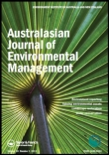
Australasian Journal of Environmental Management
Transforming insights into action for a sustainable world.The Australasian Journal of Environmental Management is a highly regarded publication in the field of environmental studies, published by Taylor & Francis Ltd. With an ISSN of 1448-6563 and an E-ISSN of 2159-5356, this journal serves as a pivotal platform for disseminating innovative research and insights pertaining to the management of environmental resources across Australia and broader geographical contexts. The journal has achieved impressive rankings, including a Q2 classification in Geography, Planning and Development and a Q3 in Management, Monitoring, Policy and Law for 2023, highlighting its relevance and impact within the academic community. Researchers and professionals are encouraged to contribute to its mission of advancing knowledge and practices in sustainable environmental management. With a publication history spanning from 1996 to 2024, the journal remains committed to fostering interdisciplinary collaboration and critical discourse on environmental challenges. While access options may vary, the significance of this journal as a resource for students and practitioners alike cannot be overstated, as it shapes contemporary perspectives on environmental policy and management.
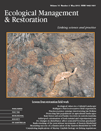
ECOLOGICAL MANAGEMENT & RESTORATION
Leading the charge in ecological management and restoration.Ecological Management & Restoration is a premier international journal published by Wiley, dedicated to advancing the fields of ecology, environmental management, conservation, and restoration practices. With an impact factor that positions it in the Q2 category across various ecological and management domains, this journal serves as a critical platform for researchers and professionals seeking to address contemporary issues related to ecosystem health, biodiversity, and sustainable management. Covering a wide range of topics from ecological restoration techniques to policy impacts on nature conservation, the journal caters to a diverse audience and contributes to the scientific community's understanding of environmental challenges. Importantly, the journal provides significant visibility, ranking in the top percentiles within key ecological research arenas such as Nature and Landscape Conservation, reinforcing its value for researchers aiming to influence both scientific thought and practical applications in ecology and management. The journal's commitment to disseminating high-quality research makes it an essential resource for students, researchers, and practitioners dedicated to fostering a sustainable future.

Anthropocene Coasts
Transforming Knowledge into Action for Coastal EnvironmentsAnthropocene Coasts is a pivotal peer-reviewed journal published by SpringerNature, dedicated to advancing the interdisciplinary understanding of coastal systems in the context of the Anthropocene epoch. Since its inception in 2018, the journal has focused on critical issues at the intersection of Nature and Landscape Conservation, Ocean Engineering, Oceanography, and Waste Management and Disposal, achieving an impressive Q2 ranking in all these categories as of 2023. With a country of origin in Canada, this journal not only addresses significant environmental challenges, but also promotes innovative solutions and sustainable practices that resonate globally. Researchers, professionals, and students engaged in marine science, environmental studies, and engineering will find valuable insights and cutting-edge research disseminated through this open-access platform. By fostering collaboration and knowledge-sharing, Anthropocene Coasts empowers its audience to contribute to the sustainable management of coastal environments in an era of rapid change.
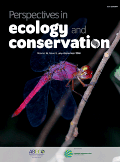
Perspectives in Ecology and Conservation
Fostering knowledge exchange in the realm of ecology and conservation.Perspectives in Ecology and Conservation, published by Elsevier Science Ltd, is a leading academic journal dedicated to advancing the fields of ecology, conservation, and environmental management. With a Q1 ranking in multiple categories, including Ecology, Management, Monitoring, Policy and Law, and Nature and Landscape Conservation, this journal boasts an impressive standing among its peers, making it essential reading for researchers and professionals. Since its inception in 2017 and running through 2024, it aims to provide innovative perspectives and critical analyses that enhance our understanding and practices in conservation science. The journal is accessible through open access options, facilitating broader dissemination of knowledge. Its commitment to addressing contemporary ecological challenges reinforces its importance in the academic community, promoting sustainable practices and informed policy-making in the face of urgent environmental issues.
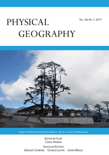
PHYSICAL GEOGRAPHY
Charting New Territories in Atmospheric and Earth SciencesPHYSICAL GEOGRAPHY is a prominent academic journal published by Taylor & Francis Ltd, focusing on a wide array of topics within the realm of physical geography, including atmospheric science, earth sciences, and environmental science. With an esteemed history since its inception in 1975 and covering research up to 2024, this journal holds significant relevance in academia, evidenced by its ranking in the Q2 category for both Earth and Planetary Sciences and Environmental Science, as well as its Q3 standing in Atmospheric Science for 2023. This journal serves as a vital platform for scholars and practitioners alike, fostering the dissemination of innovative research findings and interdisciplinary collaboration. Although it is not an Open Access journal, it remains highly regarded, with Scopus rankings placing it within the top percentile of its categories. Researchers, professionals, and students seeking to contribute to or keep abreast of critical developments in the field will find PHYSICAL GEOGRAPHY an indispensable resource for advancing their knowledge and understanding of physical geographic phenomena.
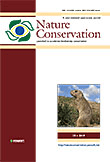
Nature Conservation-Bulgaria
Exploring the intricate web of biodiversity and conservation.Nature Conservation-Bulgaria is a distinguished peer-reviewed journal published by PENSOFT PUBLISHERS, dedicated to advancing the field of conservation through a comprehensive exploration of ecological and environmental issues. Since its inception in 2012, this Open Access journal has cemented its position as an essential resource for researchers, professionals, and students interested in the complex dynamics of ecosystems and biodiversity conservation. With an impressive Q2 ranking in both the Ecology, Evolution, Behavior and Systematics and Nature and Landscape Conservation categories, the journal showcases significant contributions to ecological scholarship, reflecting its commitment to vibrant and impactful research. The journal's coverage extends from 2012 to 2024, and it is indexed in Scopus, where it ranks in the 63rd percentile for key areas within Agricultural and Biological Sciences. With its base in Bulgaria, the journal also aims to highlight regional conservation efforts while maintaining global relevance, making it an indispensable platform for disseminating vital knowledge and fostering collaboration across the scientific community.

LANDSCAPE ECOLOGY
Fostering Insights into Dynamic Natural EnvironmentsLANDSCAPE ECOLOGY, published by SPRINGER, is a premier journal dedicated to the field of landscape ecology, bringing together innovative research that intersects ecology, geography, and conservation. With a prestigious history since its inception in 1987, this journal showcases high-impact studies reflected in its impressive 2023 rankings in the first quartile of Ecology, Geography, Planning and Development, and Nature and Landscape Conservation categories. Operating from the Netherlands, LANDSCAPE ECOLOGY serves as a critical platform for scholars and practitioners aiming to advance their understanding of spatial analysis, environmental challenges, and landscape management. While the journal operates on a traditional access model, the quality and rigor of published research ensure it remains a vital resource for the academic community, inspiring a deeper exploration of our dynamic natural environments and the socio-ecological interactions within them.